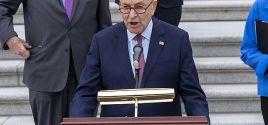Free Speech in America? What About Lynne Stewart?by Jacob G. HornbergerJan. 15, 2015 |
Popular 
AP: 'Israeli Strikes on Gaza City of Rafah Kill 22, Mostly Children, as U.S. Advances Aid Package'

Sen. Hawley: Send National Guard to Crush Pro-Palestine Protests Like 'Eisenhower Sent the 101st to Little Rock'

John Podhoretz Demands National Guard Be Sent Into Columbia U to Put Down Pro-Palestine Protests

House Passes $95B Foreign Aid Giveaway to Israel, Ukraine and Taiwan, Combined With TikTok Ban

Senate Passes FISA Spying Bill, Includes New Measure to Turn U.S. Businesses Into NSA Spies
 In the aftermath of the terrorist attack in France on Charlie Hebdo, U.S. officials are telling the world how committed they are to the principles of freedom of speech. Really? How about Lynne Stewart, the New York lawyer who was convicted and sentenced to serve time in a federal penitentiary for doing nothing more than speaking the following words to the press: I am not withdrawing my support of the cease-fire, I am merely questioning it and I am urging you, who are on the ground there to discuss it and to include everyone in your discussions as we always have done.The "I" in those words referred to a convicted terrorist named Omar Abdel-Rahmanj, who Stewart, a famous New York lawyer, was representing. Those specific words that Stewart spoke to the press were actually a note that her client had written and asked her to read to the press. What was Stewart convicted of? Supporting terrorism. One obvious question arises: What else did Stewart do to deserve her criminal conviction, her time in jail, and her disbarment as a lawyer? Did she participate in planning sessions for terrorist attacks? Did she serve as a recruiter for terrorists? Did she herself initiate terrorist attacks? The answer is no to those three questions. She didn't do anything else. All that Stewart did was to speak those particular words to the press. So, the next question arises: What in particular makes those particular words a crime to speak to the press? Let's analyze each phrase: I am not withdrawing my support of a ceasefire.What's wrong with not withdrawing support for a ceasefire? I can sort of see some federal prosecutor wanting to make a federal case out of someone withdrawing his support for a ceasefire. But I'm not sure how one makes the case that terrorism encompasses not withdrawing support of a ceasefire. Doesn't a ceasefire connote the absence of violence? If someone is supporting a ceasefire, or nonviolence, why is that terroristic? I am merely questioning it and I am urging you ... to discuss it.How is questioning a ceasefire and urging people to discuss the ceasefire terroristic? Doesn't questioning involve nothing more than a mental process on the part of the utterer? Can thinking really be considered a criminal act? Moreover, why is simply discussing whether a ceasefire should be ended considered a criminal act? What if the discussions end up with everyone supporting the ceasefire? Should that matter? Here is what the presiding judge in the Stewart case said: A rational jury could have inferred that, by relaying a statement withdrawing support for a cessation of violence by an influential, pro-violence leader of a terrorist group, Stewart knew that she was providing support to those within the IG (Islamic Group) who sought to return to violence...."But wait a minute! That isn't what Stewart did. She didn't relay "a statement withdrawing support for a cessation of violence." She did the exact opposite! She specifically said: "I am NOT withdrawing my support of the cease-fire...." It would seem that in the Orwellian world of the U.S. national-security state and the much-vaunted "war on terrorism," yes means yes and no means yes. But let's assume that the note read as that judge said it did. In fact, let's assume the worst. Let's assume that the note that Stewart read to the press expressly called on people to end all ceasefires and to violently overthrow the government. What then? Well, under U.S. national-security law it would depend on which government Stewart was referring to. If, for example, she was referring to Cuba or Venezuela, then U.S. officials would never have prosecuted her because in that case, her words would not be considered a criminal offense under U.S. national-security law. Indeed, that's precisely what the 54-year-old U.S. embargo against Cuba is all about. Its very purpose is to inflict as much economic harm on the Cuban people as possible, in the hope that the Cuban people will rise up and violently overthrow the Castro regime. That's what the CIA's sneak attack on Cuba in 1961 was all about -- getting the Cuban people to violently overthrow their own government. In fact, ever since Castro took power, U.S. officials, including the CIA and many members of Congress, have gone out of their way to exhort the Cuban people to violently overthrow the communist regime in Cuba and re-install a pro-U.S. dictator, similar to the pro-U.S. dictator who Castro ousted, Fulgencio Batista. So, why then was Stewart prosecuted, convicted, and jailed for doing nothing more than speaking words to the press, words that did nothing more than express her client's continued support for a ceasefire and calling on his followers to question it and discuss it? Under U.S. national-security law, Stewart's offense was in picking the wrong country and the wrong regime. She picked Egypt, which has long been run by one of the most brutal and corrupt military dictatorships in history, one that has long been notorious for disallowing elections, murdering peaceful protesters, shutting down critical newspapers, running torture chambers, operating commercial enterprises, maintaining strict secrecy on military expenditures, and all the other things that military dictatorships do. Why was Egypt treated differently from Cuba and Venezuela insofar as Stewart's words are concerned? Egypt is a pro-U.S. military dictatorship, one that is a loyal partner of the U.S. government, while Cuba and Venezuela have steadfastly chosen to remain independent of the U.S. national-security state. In fact, it would be difficult to find a dictatorial regime that has proven more loyal to the U.S. government than that of Egypt. Consider just one example: When the U.S. national-security state needed foreign regimes to torture people as part of its war on terrorism after 9/11, Egypt eagerly and loyally came forward to volunteer to be part of the U.S. national-security state's rendition-torture program and, in fact, actually tortured people at the request of and on behalf of the U.S. government. In fact, it's been the U.S. government that has long provided the resources, primarily in terms of weaponry, that has enabled the military dictatorship to remain firmly in control in Egypt. Even to this day, U.S. taxpayer monies in the form of weapons continue to flood into the regime to help it maintain its iron military grip over the Egyptian people. Under U.S. national-security law, no American will be permitted to call for the violent overthrow of a loyal and patriotic ally and partner like the Egyptian military dictatorship. Lynne Stewart, who ended up receiving 10-year jail sentence, learned that lesson. She should have known that when Thomas Jefferson wrote in the Declaration of Independence that people everywhere have the fundamental right to overthrow a tyrannical regime, he obviously meant to exclude tyrannies that are partners of the U.S. government. He also obviously meant to say that the exercise of fundamental, God-given rights such as freedom of speech has its limits. _ Jacob G. Hornberger is founder and president of The Future of Freedom Foundation. He was born and raised in Laredo, Texas, and received his B.A. in economics from Virginia Military Institute and his law degree from the University of Texas. He was a trial attorney for twelve years in Texas. He also was an adjunct professor at the University of Dallas, where he taught law and economics. In 1987, Mr. Hornberger left the practice of law to become director of programs at the Foundation for Economic Education. He has advanced freedom and free markets on talk-radio stations all across the country as well as on Fox News' Neil Cavuto and Greta van Susteren shows and he appeared as a regular commentator on Judge Andrew Napolitano's show Freedom Watch. View these interviews at LewRockwell.com and from Full Context. Send him email. |



